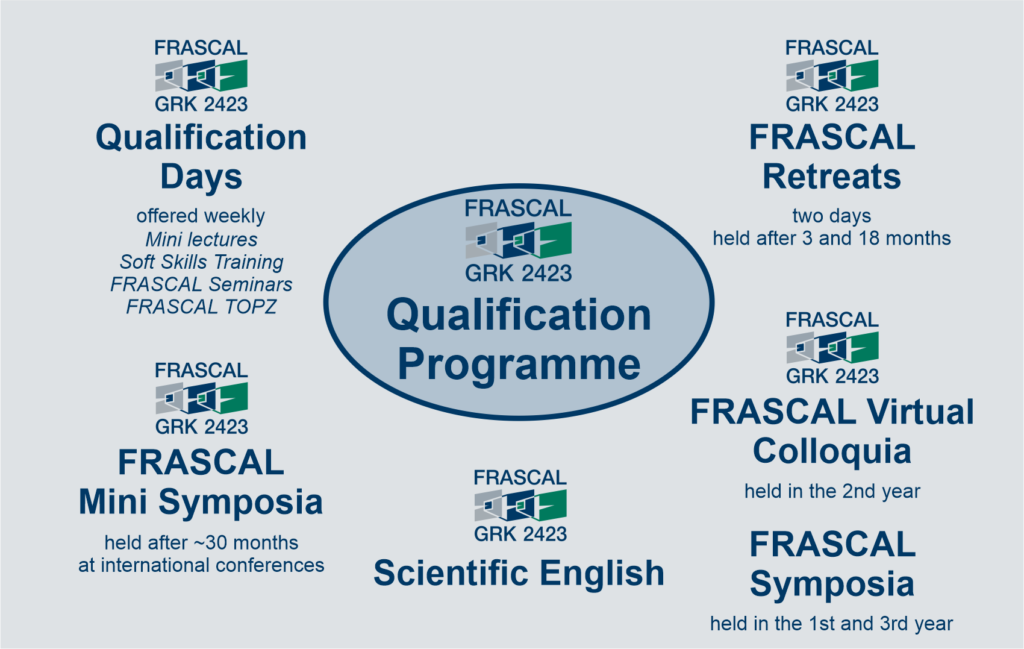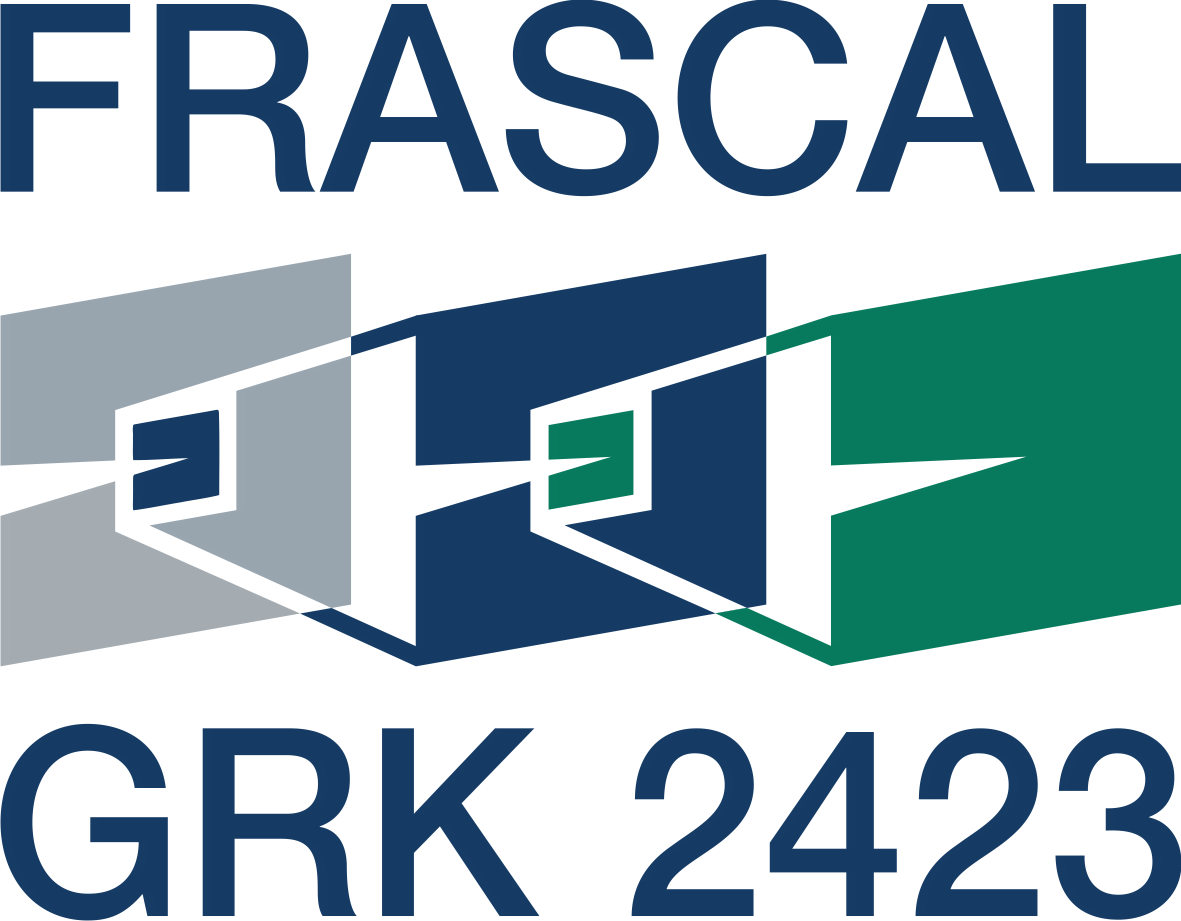Qualification

FRASCAL’s principal goal is to provide highly talented and motivated doctoral researchers with the opportunity to gain a broader interdisciplinary knowledge in the fields of particle- and continuum-based modelling and simulation techniques to capture, describe, and predict multiscale fracture of complex materials. A structured and comprehensive interdisciplinary qualification and supportive supervision concept has been established and further developed during the first funding period based on ongoing monitoring, evaluation, and feedback. It includes transparent organisational structures and processes to ensure each doctoral researcher receives extensive support, ensuring a successful and timely completion of the planned doctoral projects. Vital pillars of this concept are: (1) the installation of mentoring teams; (2) a dedicated lecture and seminar program; and (3) a transparent credit point system for the accompanying quality control. Measures are taken to acknowledge the success of the FRASCAL graduates and to foster FRASCAL’s team spirit. Examples in the first funding period include awards and certificates, as well as joint team building activities.
The qualification programme and the research programme are strongly inter-coordinated and together form the core of FRASCAL. This enables the timely, goal-oriented scientific qualification of the doctoral researchers and ensures close interactions between all institutions involved with FRASCAL.
The qualification programme comprises
- “FRASCAL Qualification Days”,
- “FRASCAL Virtual Colloquia”,
- “FRASCAL Symposia”, and
- “FRASCAL Retreats”
as basic activities. These are complemented by obligatory participation in international conferences and optional research stays abroad. Based on a credit point system each doctoral researcher is required to attend a minimum number of these activities. Averaged over three years, the resulting work load corresponds to approximately 2 SWS (Semesterwochenstunden – semester hours) per semester.
During each lecture period (typically from October to February and from April to July), one day per week is reserved for “qualification days” covering FRASCAL mini lectures, soft skills trainings, and seminars. Each qualification day attended by a doctoral researcher accounts for 0.5 SWS and thus comprises approximately 7×45 min. Social events accompanying qualification days encourage close exchange between the doctoral researchers and the mentoring teams.
FRASCAL Mini Lectures
In each lecture period, mini lectures are offered during the qualification days. Each doctoral researcher chooses appropriate mini lectures from the fields of (A) Mathematical Skills, (B) Modelling Approaches, (C) Computational Methods, as well as (D) Material Sciences Background.
An overview of representative mini lectures can be downloaded here.
FRASCAL Soft Skills Trainings
Soft skills trainings are organised in cooperation with both the “FAU Graduate Centre” and the “FAU Language Centre”. Key soft skills seminars comprise mandatory training in the rules of good scientific practice, equality & diversity, and research data management, including FAIR principles. Beyond that, optional courses, on for example scientific writing, professional presentation techniques, or conflict management may be chosen by the doctoral researchers. Since FRASCAL is educating doctoral researchers not only for later careers in university-related fields, but also in industry, courses with a focus on employability offered by the “FAU Graduate Centre” are strongly recommended to FRASCAL doctoral and associated doctoral researchers.
FRASCAL Seminars
In each lecture period (except those with a FRASCAL retreat, see below), one qualification day is reserved for a FRASCAL seminar, which is mandatory for the doctoral researchers. Within the framework of this seminar, recent developments in the doctoral and associated doctoral projects will be presented as talks of 30 min duration including a 10 min discussion. Based on these seminars, the doctoral and associated doctoral researchers can evaluate the progress of the doctoral project in comparison to the other projects together with the mentoring team.
FRASCAL TOPZ
In response to the pandemic, we replaced the originally planned monthly FRASCAL lunches with FRASCAL TOPZs (Topical Overview Presentation ZOOMposia). Typically, once per week, the qualification day is used for an informal get-together in ZOOM, at which the PAs, the spokespersons, the doctoral and associated researchers, and the postdoctoral researcher are present. Typically, the latest scientific progress and open questions from one doctoral project are briefly presented and jointly discussed. Moreover, FRASCAL TOPZs provide an informal atmosphere to discuss any organisational, administrational, and topical issues related to FRASCAL in a relaxed way. This concept, initially born out of necessity, has proved very successful and will thus be retained as a novel, independent activity in the second funding period.
To comply with restrictions imposed by the pandemic, the originally planned visitors’ workshops were replaced with the novel FRASCAL virtual colloquium in the summer semester of 2021. The first FRASCAL Virtual Colloquium, entirely organised by FRASCAL doctoral and associated doctoral researchers, comprised a weekly series of 12 guest talks by international experts tackling problems related to FRASCAL from different viewpoints. Each 45-minute talk was followed by an animated public discussion with up to 120 participants from all over the world. In-depth exchange between the doctoral researchers and the invited experts completed this new FRASCAL activity. Although initially intended as a substitute for an on-site event at FAU, this highly successful format will also be retained as a novel, independent activity in the second funding period. Hence, each cohort of doctoral researchers will organise one FRASCAL Virtual Colloquium in its second year.
To adapt to the constraints of the pandemic, the third alumni and visitor workshop was replaced with the 1st (virtual) FRASCAL Symposium as a one-day event in the winter semester of 2021. This symposium provided an opportunity to present the research priorities and latest results of FRASCAL to the international fracture community: Within the framework of this symposium, the principal advisors of the FRASCAL projects contributed their own insights into the fracture problem from a higher-level perspective and provided a basis for stimulating discussions and interaction with colleagues from around the world. In future, we plan to open up this format and additionally invite FRASCAL Mercator fellows, FRASCAL visitors, and FRASCAL alumni as speakers for on-site presentations. This way, the two FRASCAL Symposia, which will take place in the first and third year of each cohort, will serve as spatially and temporally localised counterparts to the FRASCAL Virtual Colloquium.
Alumni and visitors workshop (only 1 st funding period)
The annual alumni and visitors workshop enabled scientific exchange with external experts and shall thus stimulated intense discussions. FRASCAL’s Mercator fellows as internationally highly recognised and experienced experts participate together with additional visiting researchers from the fields encountered in FRASCAL, but also from other related research fields.
These two-day seminars were held at secluded venues outside the FAU campi and were accompanied by social activities to enable informal get-together.
Two FRASCAL retreats, which must be attended by each doctoral researcher, are held after approximately 3 and 18 months for each cohort. In contrast to the FRASCAL Virtual Colloquium and Symposia, the focus lies on the internal evaluation of the scientific progress of FRASCAL. To this end, the doctoral and associated doctoral researchers report their scientific activities to all members of FRASCAL, enabling further assessment of the scientific progress of the doctoral projects. The FRASCAL retreats are held as two-day seminars at suitable, secluded venues off the FAU campuses and will be accompanied by workshops (e.g. paper and proposal writing, funding opportunities, FRASCAL RDM), reports on career paths, and social activities to enable informal get-togethers.
International conferences are important for scientific exchange and may stimulate intense discussions on, e.g. the progress and the current state of FRASCAL. Hence, each doctoral researcher is encouraged to attend international conferences and is required to give at least two presentations during the course of their doctorate.
FRASCAL mini symposia at international conferences. In addition to the FRASCAL retreats, FRASCAL mini symposia are planned to take place within dedicated international conferences such as e.g. “International Conference on Fracture” (ICF), “International Conference on Computational Modelling of Fracture and Failure of Materials and Structures” (CFRAC), or “European Conference on Fracture” (ECF). The FRASCAL mini symposia are scheduled such that they will be held in the final phase of each cohort.
Publications in international journals, presentations at international conferences, and scientific exchange with international researchers require proficiency in scientific English. Throughout the entire funding period, a professional English language coach is available for the FRASCAL participants to train oral presentations, to proofread English publications, and to give English classes in each lecture period at an equivalent of 1 SWS (1x 45 min per week). Although the attendance of English classes is optional, it has proved highly beneficial for all doctoral researchers of the first and second cohort.
